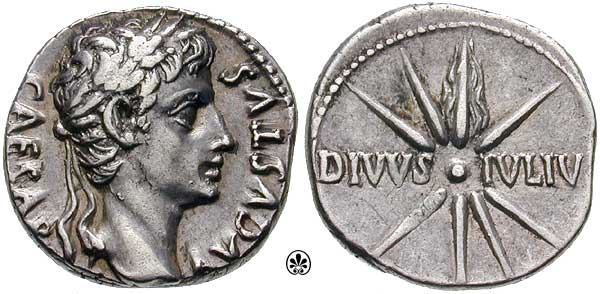“Civic Religion” is the term coined to describe a system of
worship whose cult is rendered to a human ruler in the form of homage, tribute,
loyalty and allegiance. Examples can be found in ancient Egypt, Greece and
Rome. Romulus, considered the founder of Rome, was deified and worshipped as
the deity Quirinus. Julius Caesar was the first roman living ruler to accept the
title of “divine”, when a statue of himself was erected in the temple of
Quirinus is 45 BC with an inscription: “To the invincible God”. When Julius
Caesar died, he was elevated to the status of god in equal standing with the pantheon of roman gods (a
process called ‘apotheosis’) and a cult to Jupiter Julius, complete with a
temple was established. But it was with his successor, Octavian Augustus, that
the imperial cult became fully established. After a string of catastrophes,
Octavian brought peace, stability and prosperity to the romans, and such feat
was considered so extraordinary that only a divine being could accomplish that.
There was no way to explain a power so great without appeal to a divine nature
residing within Augustus. As
adopted son of the divine Julius Caesar, Augustus started by styling himself as
“son of God”, and later accepted and actively promoted the construction of
temples dedicated to the worship of himself as a divinity. Mandatory sacrifices
to the genius of the emperor were made compulsory, and upon his death, on 14
AD, by an official decree from the roman senate, Octavian Augustus Caesar was
included among the pantheon of roman gods, and received a temple and priests.
For centuries to follow, the cult of the emperor, this form of “civic religion”
thrived both in the city of Rome and in the roman provinces.

Coin with the deified effigy of Augustus, son of the deified Julius Caesar.

Status of deified emperor Octavian Augustus.

Temple to emperor Augustus in Nimes, France.
So, here’s my question: Was Octavian Augustus a fictional
character or a real being? Since we all can agree that his existence was a
verifiable fact, it is also an undeniable fact that he was considered a deity
and received worship from humans and a religion, temples and a pristehood were
established in his honor. Just as Yahweh or the deified Jesus Christ or Aura
Mazda or any other deity that you can think of. Therefore, here is a deity that
exists, or, at least, that existed at one point in time. And here is the
problem with the atheist proposition: It requires a certain kind of deity to be
feasible. Namely, it requires a spiritual, superhuman deity that claims special
powers not commonly held by humans. This is the kind of deity that atheism
claims that doesn’t exist. However, their proposition stumbles and hits a brick
wall when a different kind of deity is being discussed. Deities DO exist, because what makes a
deity is the willingness of human beings to worship said entity. Anything and
anyone can be a deity just as long as anyone has some kind of rationale for
establishing its cult.
The type of deity that atheists take such pride in debunking
may or may not exist. But the proposition that “deities don’t exist” is plain
simply a mystification . They can exist, even if, as Simon said, the possibility that they
exist in the form that we expect them to
exist is so hugely remote that we chose to embrace the notion that it may just as well be inexistent. However, because we haven’t made a research so wide
as to scan the entire universe and all the known physical dimensions (not to mention
those dimensions who aren’t known yet, but merely theorized that exist), no one
can say with a 100% degree of absolute certainty that “no deities exist”. As
per the example above, they do exist. Hence, I stand by the proposition that
“The only thing that can be said about God is that it's absent”- absentheism.


